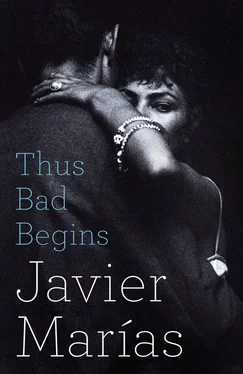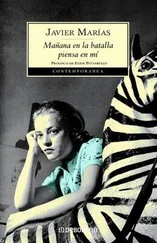And so I didn’t at all like the task Muriel had set me, because of its very nature. I had withdrawn some of the superficial esteem I had felt for Van Vechten, both equally arbitrary acts, but we allow ourselves such absolute arbitrariness with those we know only slightly, whom we see as provisional or circumstantial and not of our choosing, mere ramifications of or bequests from someone else; the problem arises if that someone else is important to us, because then we feel under an obligation to accept those inherited friends and even to care for and protect them, especially if the person who bequeathed them to us is still alive and can find out if we have done as he asked, can thank or reproach us with his quick eye, can, at the very least, notice. Sometimes someone we really care for makes an explicit request (‘Treat that person as you would treat me, as if he were me; give him whatever he asks for and help him in every way possible’), sometimes this isn’t even necessary and we mentally anticipate that request (‘I get the message, I understand and will ask no more questions’). If we are staunch supporters of a lover, a friend, a teacher, we tend to welcome all those who surround them, not just those people who are essential to them: idiot children, demanding or poisonous wives, boring, even despotic husbands, dubious or disagreeable friends, unscrupulous colleagues on whom they depend, people in whom we can detect not a single good quality, not the slightest attraction and who lead us to wonder about the origin of the admiration expressed by those beings whose approval we ourselves crave: what past events bind them together, what shared suffering, what common experiences, what secret knowledge or vengeful motives; what strange, invincible nostalgia. We try to appear friendly, pleasant and intelligent and gain a pat on the back — from our lover a kiss or what usually follows kisses, or at least a look that prolongs our hopes a little longer — and cannot understand why these shrill or dull or inadequate or limited people, who, in our eyes, are entirely without merit, should obtain gratis and for nothing what costs us such invention, brio and vigilance. The only possible answer is often simply that these people came before us, date back to long before we entered the life of the lover, friend or teacher and that we know nothing of what happened between them and probably never will; that they may have travelled many possibly muddy paths together, without us there as companion or witness. We always arrive late in people’s lives.
For me, Van Vechten was one such individual, up to a point, though not entirely. He was clearly no fool, but he lacked Rico’s depth and cleverness as well as his not always intentional absurdity, he lacked Roy’s devotion and exhaustive knowledge of Muriel’s work, which made my boss’s patience and willingness to take him under his wing perfectly understandable, he lacked the ingenuity or kindness of other friends. At the time, Van Vechten was a highly respected paediatrician with a very successful practice in the Salamanca area of Madrid, and he also acted as occasional family or duty doctor to the Muriels and to a few other prestigious or neighbouring families (by which I mean that, since he was a good friend and close neighbour, a combination of convenience and confidence meant that they would call him out for almost any reason, even if the complaint had nothing to do with his specialism and was afflicting a grown adult; he would then advise them what to do or, if it came to it, who to go to, on the few occasions when he thought a second opinion necessary, and would refer them to a consultant at the lavish hospital that had opened to a great fanfare in 1968 and where he had been appointed Head of Paediatrics). Like many men in his profession, he enjoyed rubbing shoulders with the intelligentsia and with show-business types, who tended to belong to the Left or were, at the very least, opposed to Franco, and he was well received by them — for other reasons too, I suppose: his influence and his money being among them, I fear — because in the difficult and seemingly endless years of the dictatorship, that is, during most of Van Vechten’s career, he had treated the persecuted and the victims of reprisals very well, despite having fought during the Civil War on the so-called Nationalist side and despite being on good terms with the regime, a relationship that had, in part, helped him build a successful career. His early affiliation had been watered down, if not forgotten, and later, younger generations never knew about it, as was the case with so many others who were quick to dissemble or to sever any embarrassing links, or else to sit on the fence and act with generosity and understanding towards the losers: they were sometimes quite sincere, supporters of the new harmony (which ultimately depended on them); others were equally quick to see what was likely to happen in the long term and were mere opportunists. The latter were always aware that even in a situation in which the winners ruled absolutely and completely crushed the opposition or their scattered and battered remnants, it suited them to be at least partly on good terms with everyone or to have them all partly in their debt, or at least not to be seen by anyone as their bitter enemy. They know that any such remnant will, sooner or later, regroup and recover enough to reorganize itself and reconquer those areas despised and ignored by the current tyrant, usually because he has no idea what to do with them: in Spain, for example, this applied to culture and the arts.
Van Vechten had been one of the sincere ones, at least he had that reputation. It was said that even during the 1940s and 50s, when the repression was still at its most hyperactively meticulous, and he could have been accused of being nice to the ‘Reds’ and thus damaged his career prospects, he had nonetheless made home visits, completely free of charge, to the sick children of individuals who had been purged and those who had been banned from exercising their professions and were thus condemned to earning nothing or only what they managed to scrape together as and when they could (an eminent botanist was reduced to working as a gardener and certain university professors became teachers at some modest language academy), obliging their wives and older daughters to offer their services as seamstresses or cleaners in the wealthy households of those who had them in their power or of the black marketeers who took advantage of everyone. Van Vechten had been conciliatory or magnanimous and compassionate, as had some of his colleagues, and he had appeared promptly to deal with cases of influenza and colic and measles, mumps and chickenpox, even meningitis and other such serious ailments afflicting those proscribed children. He had salved and saved many small lives, a service for which the parents could not have paid or only with great difficulty and by sliding into unpayable debt and bankruptcy. He had built a reputation as a good, kind man, civilized and caring, and with the passing of time — which passes particularly slowly during dictatorships, where everything becomes legend, often heavily embellished, especially if the interested party has a role in spreading that legend — democratic, cultivated people had come to consider him to be one of them, quite ignorant of how he had prospered under the regime or else attributing this to his extraordinary professional skills, his ability to get on with everyone and to move easily in all circles, and a little, too, to the luck that accompanies any success. This gave him the aura of a moderate, theoretical and almost semi-heroic left-winger, someone who, in the hardest of times, had put his shoulder to the wheel and run risks in order to help valuable, useful people who had been cast into the outer darkness to fend for themselves.
Читать дальше












